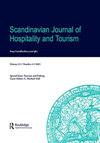规划荒野旅游时纯粹主义尺度的实用性
IF 3.6
4区 管理学
Q2 HOSPITALITY, LEISURE, SPORT & TOURISM
Scandinavian Journal of Hospitality and Tourism
Pub Date : 2022-03-14
DOI:10.1080/15022250.2022.2049361
引用次数: 1
摘要
摘要荒野是一种重要的旅游资源,但它对过度使用非常敏感。为了保持其吸引力,荒野目的地需要仔细规划和管理。为此,已经开发了几个模型,其中一个是所谓的纯粹主义规模模型。它用于根据游客对荒野目的地的偏好和态度对其进行细分。游客被要求按照纯粹主义的标准对与荒野地区的管理和质量有关的特定项目进行排名,并给出描述他们态度的分数。一些研究使用了定量方法,目的是改进纯粹主义量表。这项研究的新颖之处在于采用定性方法来探索纯粹主义量表在管理荒野目的地方面的实用性。它基于在冰岛兰德曼纳劳加荒野地区进行的半结构化采访,目的是调查游客对纯粹主义物品进行排名的理由。研究结果强调了哪些纯粹主义项目有助于将游客分为不同的部分,哪些则不然。该研究确定了几个质疑纯粹主义量表实用性的方面,包括项目感知意义的差异以及对项目进行排名时所采用的视角。本文章由计算机程序翻译,如有差异,请以英文原文为准。
The practicality of purism scales when planning tourism in wilderness
ABSTRACT Wilderness is an important resource for tourism but it is very sensitive to overuse. In order to maintain their attraction, wilderness destinations need to be planned and managed carefully. For that purpose, several models have been developed, one of which is the so-called purism scale model. It is used for segmenting visitors based on their preferences and attitudes towards wilderness destinations. Visitors are asked to rank particular items relating to the management and qualities of wilderness areas along a purism scale and are given a score describing their attitudes. A few studies have used quantitative methods with the aim of improving purism scales. The novelty of this study is adopting a qualitative approach to explore the practicality of purism scales for managing wilderness destinations. It is based on semi-structured interviews in a wilderness area in Iceland, Landmannalaugar, with the aim of investigating the reasoning that visitors have for ranking purism items. The results highlight which purism items are useful to divide visitors into different segments and which ones are not. The study identifies several aspects which question the practicality of purism scales, including differences in the perceived meaning of items and the perspective adopted when ranking the items.
求助全文
通过发布文献求助,成功后即可免费获取论文全文。
去求助
来源期刊
CiteScore
7.90
自引率
8.30%
发文量
14
期刊介绍:
Scandinavian Journal of Hospitality and Tourism is the leading Nordic journal for hospitality and tourism research. SJHT aims at initiating and stimulating high-impact and innovative research relevant for academics and practitioners within the hospitality and tourism industries. The journal takes an interdisciplinary approach including, but not limited to geography, psychology, sociology, history, anthropology, and economics. SJHT encourages research based on a variety of methods, including both qualitative and quantitative approaches. The journal covers all types of articles relevant to the Nordic region, as well as the North Atlantic, North Sea and Baltic regions. We also welcome reviews and conceptual articles with a broader geographical scope that clearly enhance the theoretical development of the hospitality and tourism field. In addition to research articles, we welcome research notes and book reviews. Published articles are the result of anonymous reviews by at least two referees chosen by the editors for their specialist knowledge.

 求助内容:
求助内容: 应助结果提醒方式:
应助结果提醒方式:


